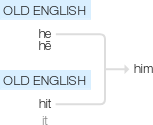Him
来自Big Physics
Old English, dative singular form of he, hē ‘he’ and hit ‘it’.
wiktionary
From Middle English him, from Old English him, from Proto-Germanic *himmai(“to this, to this one”). Cognate with Saterland Frisian him(“him”), West Frisian him(“him”), Sylt North Frisian ham, höm(“him”), Dutch hem(“him”), German Low German hum, hüm, em(“him”), German ihm(“him”, dative).
etymonline
him (pron.)
Old English him, originally dative masculine and neuter of he, from Proto-Germanic *hi- (see he). Beginning 10c. it replaced hine as masculine accusative, a process completed by 15c. The dative roots of the -m ending are retained in German (ihm) and Dutch (hem). Hine persists, barely, as the southern England dialectal 'un, 'n for "him."
